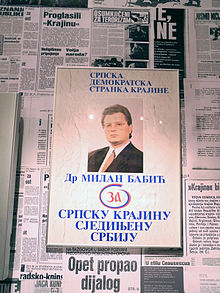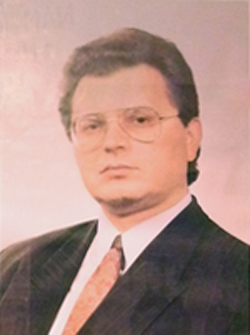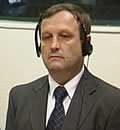Presidential election | ||||||||||||||||
| ||||||||||||||||
| ||||||||||||||||
| ||||||||||||||||

General elections were held in the Republic of Serbian Krajina on 12 December 1993, with a second round of the presidential election on 23 January 1994.
Presidential election | ||||||||||||||||
| ||||||||||||||||
| ||||||||||||||||
| ||||||||||||||||

General elections were held in the Republic of Serbian Krajina on 12 December 1993, with a second round of the presidential election on 23 January 1994.
Martić was supported by Slobodan Milošević during the presidential election in Serbian Krajina. [1] Martić ran for the Serb Party of Socialists which received significant financial support from Milošević's Socialist Party of Serbia. [2] On 21 January, Martić stated that he would “speed up the process of unification” and “pass on the baton to our all Serbian leader Slobodan Milošević." [3]
Martić received 54,000 fewer votes than Babić in the first round, but went on to win the second round with 104,234 votes. [1] [4] [5] [6] [7]
| Candidate | Party | First round | Second round | |||
|---|---|---|---|---|---|---|
| Votes | % | Votes | % | |||
| Milan Babić | Serb Democratic Party | 114,767 | 49.3 | 97,377 | 48.30 | |
| Milan Martić | Serb Party of Socialists | 60,386 | 25.9 | 104,234 | 51.70 | |
| Rade Leskovac | Serbian Radical Party | 26,523 | 11.4 | |||
| Four other candidates | ||||||
| Total | 201,611 | 100.00 | ||||
| Valid votes | 201,611 | 97.17 | ||||
| Invalid/blank votes | 5,864 | 2.83 | ||||
| Total votes | 207,475 | 100.00 | ||||
| Source: UPI | ||||||
| Party | Seats | |
|---|---|---|
| Serb Democratic Party | 33 | |
| Serbian Democratic Party of the Serbian Lands | 17 | |
| Serbian Radical Party | 16 | |
| Civic Union | 8 | |
| Serb Party of Socialists | 6 | |
| Social Democratic Party | 5 | |
| Total | 85 | |
| Source: Gulić | ||

Milan Milutinović was a Serbian politician who served as the president of Serbia from 1997 to 2002.

The Socialist Party of Serbia is a political party in Serbia. Ivica Dačić has led SPS as its president since 2006.

The Democratic Opposition of Serbia was a wide electoral alliance of political parties in Serbia, intent on ousting the ruling Socialist Party of Serbia and its leader, Slobodan Milošević.

Milan Babić was a Croatian Serb politician and war criminal who served as the first president of the Republic of Serbian Krajina, a self-proclaimed state largely populated by Serbs of Croatia that wished to break away from Croatia during the Croatian War of Independence.

The Republic of Serbian Krajina or Serb Republic of Krajina, known as the Serbian Krajina or simply Krajina, was a self-proclaimed Serb proto-state, a territory within the newly independent Republic of Croatia, which it defied, and which was active during the Croatian War of Independence (1991–95). It was not recognized internationally. The name Krajina ("Frontier") was adopted from the historical Military Frontier of the Habsburg monarchy (Austria-Hungary), which had a substantial Serb population and existed up to the late 19th century. The RSK government waged a war for ethnic Serb independence from Croatia and unification with the Federal Republic of Yugoslavia and Republika Srpska.
Branislav Ivković, known as Bane, is a Serbian engineer, academic, and former politician. He was a cabinet minister in the government of Serbia from 1994 to 2000 and served in the parliaments of Serbia, the Federal Republic of Yugoslavia, and Serbia and Montenegro. At one time a prominent figure in the Socialist Party of Serbia, he led the breakaway Socialist People's Party in the early 2000s.
The Z-4 Plan was a proposed basis for negotiations to end the Croatian War of Independence with a political settlement. It was drafted by Peter W. Galbraith, Leonid Kerestedjiants and Geert-Hinrich Ahrens on behalf of a mini-Contact Group comprising United Nations envoys and diplomats from the United States, Russia and the European Union. The co-chairs of the International Conference on the Former Yugoslavia, David Owen and Thorvald Stoltenberg, were closely involved in the political process surrounding the plan. The document was prepared in the final months of 1994 and early 1995 before being presented to Croatian President Franjo Tuđman and the leaders of the self-declared Republic of Serbian Krajina (RSK) on 30 January 1995. Tuđman was displeased with the proposal, but accepted it as a basis for further negotiations. However, the RSK authorities even refused to receive the document before UNPROFOR mandate status was resolved. According to later reactions, RSK leadership was not satisfied with the plan.

Milan Martić is a Croatian Serb politician and war criminal who served as the president of the unrecognized Republic of Serbian Krajina, a self-proclaimed state largely populated by Serbs of Croatia that wished to break away from Croatia during the Croatian War of Independence.
The Baćin massacre was the killing of 83 civilians just outside the village of Baćin, near Hrvatska Dubica, committed by Croatian Serb paramilitaries. The killings took place on 21 October 1991 during the Croatian War of Independence. Most of the civilians were Croats, but they also included two ethnic Serbs, taken from Hrvatska Dubica, Baćin and the nearby village of Cerovljani. The civilians were killed in the area of Krečane, at the very bank of the Una River, and their bodies were left unburied for two weeks. Most of them were subsequently bulldozed into a shallow mass grave, while a number of the bodies were thrown into the river. Further killings of Croat civilians continued in Baćin and surrounding areas until February 1992.
Presidential elections were held in the Yugoslav province of Serbia on 8 December 2002. They followed elections in September and October which were invalidated due to voter turnout not meeting the 50% requirement. Although the legal requirement of a turnout of at least 50% of registered voters was dropped for the second round of this election, turnout in the first round was below 50%, invalidating the election before a second round.
The List for Sandžak was a minority coalition representing ethnic Bosniaks in Serbia. It was led by Sulejman Ugljanin and included:

The Log Revolution was an insurrection which started on August 17, 1990, in areas of the Republic of Croatia which were populated significantly by ethnic Serbs. A full year of tension, including minor skirmishes and sabotage, passed before these events would escalate into the Croatian War of Independence.

The Serb Democratic Party was a political party in Croatia whose primary constituency was representing the Serbs of Croatia. It led the Republic of Serbian Krajina between its foundation in 1990 until its collapse in 1995.

The Republic of Serbia was a constituent state of the Federal Republic of Yugoslavia between 1992 and 2003 and the State Union of Serbia and Montenegro from 2003 to 2006. With Montenegro's secession from the union with Serbia in June 2006, both became sovereign states in their own right for the first time in nearly 88 years.
The Serb Party of Socialists was the branch in Croatia of Serbian president Slobodan Milošević's Socialist Party of Serbia which was created in the areas under the control of the rebel state Republic of Serbian Krajina, controlled by Croatian Serbs.

Slobodan Milošević was a Yugoslav and Serbian politician who was the President of Serbia between 1989–1997 and President of the Federal Republic of Yugoslavia from 1997 until his оverthrow in 2000. Milošević played a major role in the Yugoslav Wars and became the first sitting head of state charged with war crimes.
Radovan Pankov is a former politician in Serbia. He was minister of the diaspora in the Serbian government from 1994 to 1998 and served in the Serbian and Yugoslavian parliaments. During his political career, Pankov was a member of the Socialist Party of Serbia.
Slobodan Vučković is a lawyer and former politician in Serbia. He was a prominent opponent of Slobodan Milošević's government in the 1990s and served for three terms in the National Assembly of Serbia. Vučković was at different times a member of the Democratic Party and the Democratic Centre.
Dragoslav Miličić is a Serbian entrepreneur and former politician. He served in the assembly of the Federal Republic of Yugoslavia from 1993 to 1996. A prominent opponent of Slobodan Milošević's government in the 1990s, Miličić was at different times a member of the Serbian Renewal Movement and the Democratic Party.
The Labour Party of Serbia was a social democratic political party in Serbia. It was established in 2002 as the political wing of Serbia's Association of Free and Independent Trade Unions, and for the early part of its existence it was a constituent member of the Democratic Opposition of Serbia. The party largely became inactive after a poor showing in the 2003 Serbian parliamentary election.
{{cite book}}: CS1 maint: location missing publisher (link)